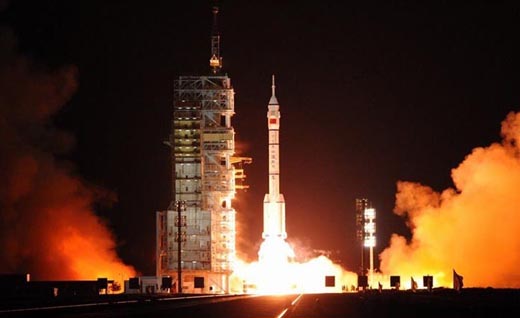India puts its first GPS satellite in orbit
Mangaloretoday/DHNS
Chennai, July 7 , 2013 : The Indian space agency Saturday evening successfully put its first navigation satellite - the Indian Regional Navigation Satellite System-1A (IRNSS-1A) - in the geosynchronous orbit at 27 degrees to the equator, said officials Sunday.
Indian Space Research Organisation (ISRO) officials also said tests are being carried on its cryogenic engine that was mated with its heavier rocket, the Geosynchronous Satellite Launch Vehicle (GSLV) Friday.

With respect to IRNSS-1A, five orbit-raising activities were done by firing the satellite’s on-board motors towards its geo-synchronous orbit at 36,000 km since July 2.
The IRNSS-1A was launched July 1 from ISRO’s spaceport in Sriharikota in Andhra Pradesh, around 80km from here.
The orbit-raising activities were done from the mission control facility at Hassan in Karnataka.
ISRO officials told IANS that everything connected with IRNSS-1A is normal and the satellite is slowing floating towards its final intended circular geosynchronous orbit at 55 degrees East location with an inclination of 29 degrees to the equator.
Officials said once the satellite reaches its target orbit, then its drift would be arrested.
Speaking about the cryogenic engine tests, officials said it will go on for around 20 days following which the satellite will be mated with the rocket.
ISRO chairman K. Radhakrishnan had announced that GSLV rocket powered by India’s own cryogenic engine carrying communication satellite GSat-14 will be launched Aug 6.
This will be the first mission of GSLV during the last three years after two such rockets failed in 2010.
One of the GSLV rockets flew with Indian cryogenic engine and the other one with a Russian engine.
The GSLV is a three stage/engine rocket. The first stage is fired with solid fuel, the second is the liquid fuel and the third is the cryogenic engine.
- Mangaluru: Congress protests against fuel, LPG price hike
- Belthangadi: Volleyball coach booked under POCSO act for harassing minor girl
- Union Minister Somanna orders no removal of sacred threads, mangalsutras during Railways Exams
- Manjeshwar: Youth shot at by unidentified assailants
- Kasargod: 12 injured as 2 private buses collide
- Mangaluru: Man found dead near Kudupu
- India to launch GPS-based toll collection system from May 1, phasing out FASTag
- Govt. grants another ₹40 crore for ongoing Kallapu-Sajipa riverfront road project, says U.T. Khader
- No decision yet on revoking suspension of 18 BJP MLAs, says U.T. Khader
- Vitla: Couple threatened with death - FIR filed against Sangh Parivar leader Muralikrishna Hasantadka
- Puttur: Senior citizen dies after truck rams his scooter
- Three interstate robbers arrested in Brahmavar gold chain snatching case; car seized
- Hebri: Youth dies after slipping into Seethanadi river
- ’When they shot your mother...’: Asaduddin Owaisi reminds Pak’s Bilawal Bhutto
- 26/11 plotter Tahawwur Rana’s NIA custody extended by 12 days
- BJP petitions Governor seeking revocation of suspension of 18 MLAs from Assembly
- India, France sign Rs 63,000 crore deal for 26 Rafale-M jets for Navy
- Kerala Chief Minister’s office, residence gets bomb threat, probe on
- Pahalgam attack: Terrorists used Chinese apps, devices to communicate with Pakistani handlers
- Sedition case against singer for provocative posts on Pahalgam attack
- Shashi Tharoor on Bilawal Bhutto’s remarks- blood will flow...
- One killed, many injured as gallery collapses during Kabaddi match in Mandya
- India bans 16 Pak YouTube channels amid rising tensions
- Will support Centre in fight against terror, says Mallikarjun Kharge
- Anytime, anywhere: Indian Navy’s message with Arabian Sea warship visuals
- Skills and Competencies Take Center Stage at MSN Dialogue Series
- Court remands Maoist Lakshmi to six-day police custody
- Sandhya Shenoy honored with Society for Materials Chemistry Medal-2024
- White Cornus Apartment in Mangaluru
- City girl wins first place in state-level spell bee competition
- Alleged ‘Love Jihad’ Case in Mangaluru: Woman left home voluntarily, says police
- Girl fatally struck by reckless two-wheeler near Belman
- New residential complex for the judges inaugurated in Mangaluru
- Absconding accused nabbed after 8 years
- Truck with cylinders turns turtle in Beltangady
- Bhoota Kola artist dies of cardiac arrest
- Development of the country should be our goal: Ganesh Karnik
- Container truck gets stuck under Modankap railway bridge
- Truck crushes bike’s pillion rider near BC Road
- Head constable dies of heart attack
- CITY INFORMATION
- TRAVEL
- TOURIST INFORMATION
- HEALTH CARE
- MISCELLANEOUS




 Write Comment
Write Comment E-Mail To a Friend
E-Mail To a Friend Facebook
Facebook Twitter
Twitter  Print
Print 


